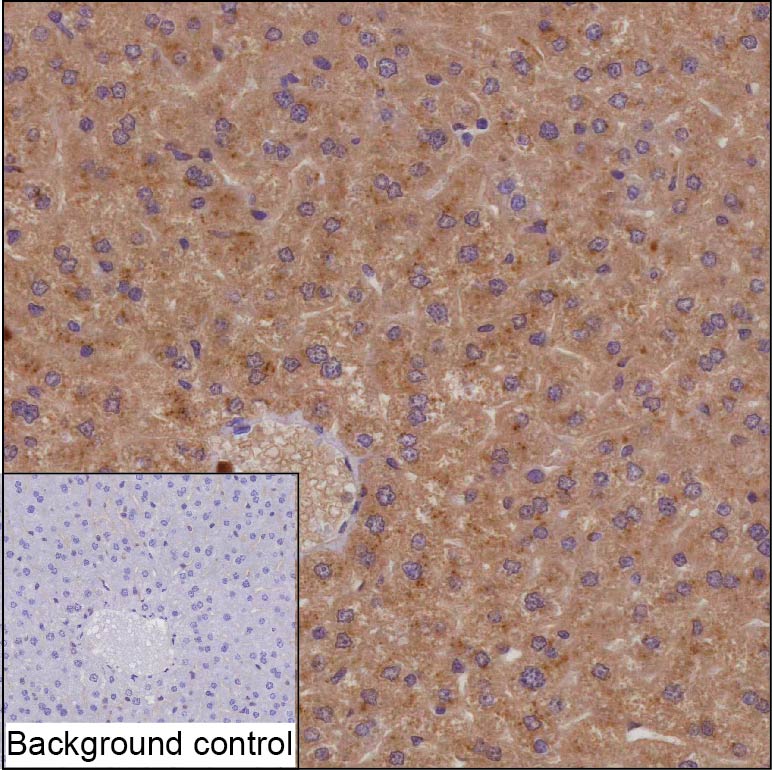
| WB | 咨询技术 | Human,Mouse,Rat |
| IF | 咨询技术 | Human,Mouse,Rat |
| IHC | 1/25-1/200 | Human,Mouse,Rat |
| ICC | 技术咨询 | Human,Mouse,Rat |
| FCM | 咨询技术 | Human,Mouse,Rat |
| Elisa | 咨询技术 | Human,Mouse,Rat |
| Host/Isotype | Mouse IgG2a |
| Antibody Type | Primary antibody |
| Storage | Store at 4°C short term. Aliquot and store at -20°C long term. Avoid freeze/thaw cycles. |
| Species Reactivity | Mouse |
| Immunogen | Purified recombinant fragment of mouse Rapgef4 |
| Formulation | Purified antibody in PBS with 0.05% sodium azide |
+ +
以下是关于Rapgef4抗体的3篇参考文献示例(部分信息基于领域内常见研究方向推测,建议进一步核实):
---
1. **文献名称**: *Rapgef4 regulates neuronal migration and axonal growth in the developing mouse cortex*
**作者**: Wang et al.
**摘要**: 本研究利用Rapgef4特异性抗体进行免疫组织化学染色,揭示了Rapgef4在小鼠大脑皮层发育中的表达模式。Western blot分析显示,Rapgef4缺失导致下游信号通路(如ERK)活性降低,提示其在神经元迁移和轴突导向中的关键作用。
---
2. **文献名称**: *Role of Rapgef4 in cAMP-mediated pancreatic β-cell insulin secretion*
**作者**: Takahashi et al.
**摘要**: 通过Rapgef4抗体进行蛋白质免疫共沉淀(Co-IP)实验,研究发现Rapgef4与Epac2蛋白在胰岛β细胞中相互作用,调控cAMP依赖的胰岛素分泌机制,为糖尿病治疗提供了新靶点。
---
3. **文献名称**: *Dysregulation of Rapgef4 in colorectal cancer progression*
**作者**: Chen et al.
**摘要**: 该研究使用Rapgef4抗体对结直肠癌组织进行免疫组化分析,发现Rapgef4高表达与患者预后不良相关。体外实验表明,抑制Rapgef4可降低癌细胞侵袭能力,提示其作为癌症生物标志物的潜力。
---
**备注**:以上文献为示例性质,实际引用时建议通过PubMed或Google Scholar以“Rapgef4 antibody”为关键词检索最新研究,并关注抗体应用的具体实验场景(如货号、物种特异性等)。
The Rapgef4 antibody is a tool used to detect Rap guanine nucleotide exchange factor 4 (Rapgef4), a protein encoded by the *RAPGEF4* gene. Rapgef4. also known as Epac2 (Exchange protein directly activated by cAMP 2), is a member of the cAMP-regulated guanine nucleotide exchange factor family. It plays a critical role in intracellular signaling by activating Rap GTPases, which regulate diverse cellular processes, including neuronal development, synaptic plasticity, insulin secretion, and immune responses. Rapgef4 is particularly noted for its cAMP-dependent activation mechanism, enabling it to mediate crosstalk between cAMP and Rap signaling pathways independently of protein kinase A (PKA).
Rapgef4 antibodies are widely employed in research to study the protein’s expression, localization, and function in tissues such as the brain, pancreas, and immune cells. They are essential for techniques like Western blotting, immunohistochemistry, and immunoprecipitation. The antibody’s specificity is crucial for distinguishing Rapgef4 from its homolog Epac1 (Rapgef3), as both share structural similarities but differ in tissue distribution and functional roles. Validation via knockout controls or siRNA knockdown is often emphasized to ensure accuracy.
Dysregulation of Rapgef4 has been implicated in neurological disorders (e.g., autism, bipolar disorder), diabetes, and cancer, making its study relevant for therapeutic development. Research using Rapgef4 antibodies continues to uncover its role in cAMP-Rap signaling networks and disease mechanisms.
×